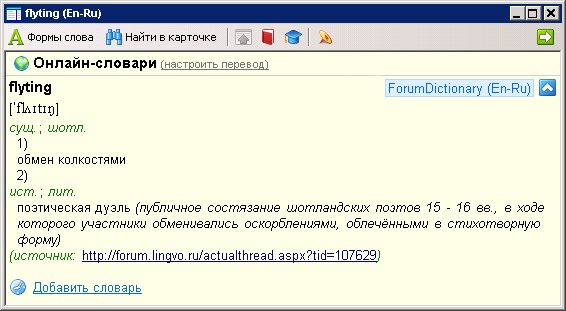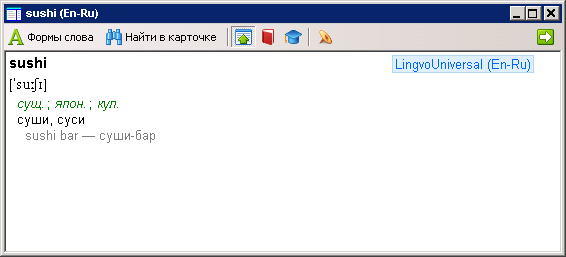Kitchen ABBYY Lingvo: conversations in the ranks!
 Each dictionary entry is the result of not only studying sources, working with materials, checking with dictionaries, but also the result of live communication, often polemics.
Each dictionary entry is the result of not only studying sources, working with materials, checking with dictionaries, but also the result of live communication, often polemics. For the latter, we have a database of complaints - a resource where errors and lacunae of Lingvo dictionaries found by us or users are recorded and discussed.
We wanted to talk about the complaints base for a long time, but we didn’t dare - after all, our lexicographers’s mecca, one might say, is a “sacred cow” for each developer. But what is Lingvo’s cuisine without a base of complaints, because this is where the hottest discussions take place on how to make the Lingvo dictionary!
1. About the cynical Scottish dueling poets
Lexicographer 1:
According to a proposal on the forum , an article has been added:
flyting : flyting
noun, short.
1) an
exchange of barbs (demonstrates mastery of the skills of the art of eloquence)
2)
<hist .; lit.> poetic duel
Lexicographer 2:
I doubt the "source .; lit. ” At least in Russian, “poetic duel” is used in the modern context, though in a figurative sense.
Lexicographer 3:
+ this is a poetic duel of an insulting property (poetical invective, originally, a kind of contest practiced by the Scottish poets of the 16th c., In which two persons assailed each other alternately with tirades of abusive verse; also in extended use OxDic) .
Lexicographer 1:
I propose then to put it this way: a
poetic duel (a public contest of Scottish poets from the 15th to 16th centuries)
Lexicographer 3:
This is not just a contest, but a contest consisting in insulting each other in a poetic form.
Translator:
and with particular cynicism,
Lexicographer 1:
it seemed to me that the word “duel” already implies certain attacks on each other, it follows from the word “poetic” that the attacks were verbal, the essence still boils down to demonstrating one’s own coolness as a speaker of
Lexicographer 2:
Fixed:
<st .; lit.> poetic duel ({{public contest of Scottish poets of the 15th-16th centuries; during the contest, the participants exchanged insults clothed in poetic form}})
Status changed: Actual -> Fixed
PS The result of this discussion can also be viewed in Lingvo:

2. Sushi in Russian
Lexicographer – trainee (Japanese):
The word sushi is translated into Russian as “sushi”. And Carthage must be destroyed.
Lexicographer 1:
Spelling dictionaries of the Russian language already give "sushi, sushi." Yes, the rules of phonetic transmission are violated. But what can you do - Uzus!
As you know, the process of borrowing foreign-language lexemes can be: a) direct (directly from the source language), b) indirect (through some other language). We nevertheless borrowed the word "sushi" not directly from the Japanese language (then, undoubtedly, it would be "sushi"), but from English. Hence - “sushi” (from the English form sushi, according to the rules of phonetic transcription).
What one cannot but agree with is that it is necessary to give as a translation not only the version of “sushi”, but also “sushi” too.
Severity changed: Critical bug -> Suggestion
Lexicographer 2:
Sushi is flattened.
Status changed: Actual -> Fixed
Lexicographer-trainee:
The word was borrowed from Japanese (open any publication until 1991) and then borrowed again through English. Uzus is an ostrich, but I would put sushi in the first place, and barbarism in the second with the explanation that this is a secondary borrowing.
Status changed: Fixed -> Verified
Lexicographer 1:
We don’t give comments on “primary / secondary borrowing” in our dictionary. If we give in one particular case, then it will look at least strange. Systematically putting down the entire dictionary is unrealistic - there is no time.
We do not have translation equivalents by etymological principle, but by frequency. In terms of frequency, “land” is noticeably ahead.
As for the secondary borrowing: the secondary borrowing usually takes place when the primary “did not take root”, is forgotten or continues to languishly exist as local exotism. And in the case of secondary indirect borrowing, we cannot prohibit the intermediary language from influencing the form of the word borrowed through it.
Lexicographer 2:
“Sushi” still took root in the Russian language (8 million on Yandex, against 202 thousand “sushi”). Until 1991, Russia simply did not have the reality itself and it did not matter what they were called.
Lexicographer 1:
Agree. In fact, "sushi" appeared in the language as exoticism, equivalent vocabulary. “Sushi” is already a designation of the reality that came to us not directly from Japan, after all.
Lexicographer-trainee:
Until 1991, there was no reality, but special. and thin. liter about Japan was. There are really more sushi, but there is a movement for sushi that is gaining strength, and part of the institutions of japaniz style-catering are written in the "sushi" menu. When deciding which spelling to put in the first place, we indicate which side we are on and (more importantly) give one side or another a powerful argument in a holy war.
Status changed: Verified -> Actual
Lexicographer 1:
Colleagues, we don’t have time to stagnate for a long time. We give both options, arranging them in frequency. This is our general principle, which over the past years we have been trying to implement in our articles. But breaking spears is not worth it. There is data from the explanatory dictionaries of the Russian language, there is data from search engines and corps. We have no right to ignore this data for the sake of our concepts, imitating those researchers for whom there are no wrong concepts, but there are wrong facts.
Lexicographer 2:
I understand and share the professional accuracy of a Japanese scientist, but let's leave as the Russian language decided, otherwise we will soon begin to read and put on Hamlet.
Status changed: Actual -> Fixed
PS now the sushi article in Lingvo looks like this:

The original of this post is publishedABBYY Lingvo Team Blog .
Natalya Frolova,
Department of Linguistic Products
